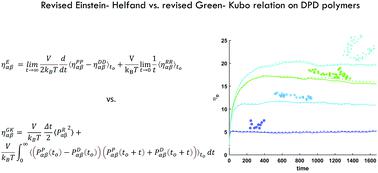当前位置:
X-MOL 学术
›
Soft Matter
›
论文详情
Our official English website, www.x-mol.net, welcomes your
feedback! (Note: you will need to create a separate account there.)
Comparison of equilibrium techniques for the viscosity calculation from DPD simulations
Soft Matter ( IF 2.9 ) Pub Date : 2021-08-16 , DOI: 10.1039/d1sm00891a Maria Panoukidou 1 , Charlie R Wand 1 , Paola Carbone 1
Soft Matter ( IF 2.9 ) Pub Date : 2021-08-16 , DOI: 10.1039/d1sm00891a Maria Panoukidou 1 , Charlie R Wand 1 , Paola Carbone 1
Affiliation

|
Dissipative Particle Dynamics (DPD) is a powerful mesoscopic modelling technique that is routinely used to predict complex fluid morphology and structural properties. While its ability to quickly scan the conformational space is well known, it is unclear if DPD can correctly calculate the viscosity of complex fluids. In this work, we estimate the viscosity of several unentangled polymer solutions using both the Einstein and Green–Kubo formulas. For this purpose, an Einstein relation is derived analogous to the revised Green–Kubo formula suggested by Jung and Schmid, J. Chem. Phys., 2016, 144, 204104. We show that the DPD simulations reproduce the dynamical behaviour predicted by the theory irrespectively of the values of the conservative and friction parameters used and estimate a Schmidt number compatible to that of a fluid system. Moreover, we observe that the Einstein method requires shorter trajectories to achieve the same statistical accuracy as the Green–Kubo formula. This work shows that DPD can confidently be used to calculate the viscosity of complex fluids and that the statistical accuracy of short trajectories can be improved by using our revised Einstein formula.
中文翻译:

从 DPD 模拟计算粘度的平衡技术比较
耗散粒子动力学 (DPD) 是一种强大的细观建模技术,通常用于预测复杂的流体形态和结构特性。虽然它快速扫描构象空间的能力是众所周知的,但尚不清楚 DPD 是否可以正确计算复杂流体的粘度。在这项工作中,我们使用爱因斯坦和格林-库博公式估计了几种未缠结聚合物溶液的粘度。为此,推导出类似于 Jung 和 Schmid、J. Chem建议的修正 Green-Kubo 公式的爱因斯坦关系式。物理。, 2016, 144, 204104. 我们表明 DPD 模拟表明了理论预测的动态行为,而不管使用的保守参数和摩擦参数的值如何,并估计与流体系统的施密特数兼容的施密特数。此外,我们注意到爱因斯坦方法需要更短的轨迹才能达到与 Green-Kubo 公式相同的统计精度。这项工作表明,DPD 可以自信地用于计算复杂流体的粘度,并且可以通过使用我们修改后的爱因斯坦公式来提高短轨迹的统计精度。
更新日期:2021-08-25
中文翻译:

从 DPD 模拟计算粘度的平衡技术比较
耗散粒子动力学 (DPD) 是一种强大的细观建模技术,通常用于预测复杂的流体形态和结构特性。虽然它快速扫描构象空间的能力是众所周知的,但尚不清楚 DPD 是否可以正确计算复杂流体的粘度。在这项工作中,我们使用爱因斯坦和格林-库博公式估计了几种未缠结聚合物溶液的粘度。为此,推导出类似于 Jung 和 Schmid、J. Chem建议的修正 Green-Kubo 公式的爱因斯坦关系式。物理。, 2016, 144, 204104. 我们表明 DPD 模拟表明了理论预测的动态行为,而不管使用的保守参数和摩擦参数的值如何,并估计与流体系统的施密特数兼容的施密特数。此外,我们注意到爱因斯坦方法需要更短的轨迹才能达到与 Green-Kubo 公式相同的统计精度。这项工作表明,DPD 可以自信地用于计算复杂流体的粘度,并且可以通过使用我们修改后的爱因斯坦公式来提高短轨迹的统计精度。











































 京公网安备 11010802027423号
京公网安备 11010802027423号